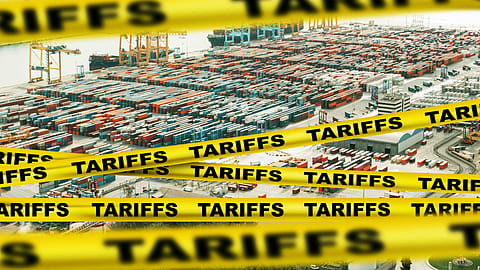Invoking national interest, Centre urges big businesses to shield MSMEs from tariff shock
The need of the hour for bigger corporates is to come forward and handhold the micro, small and medium enterprises in the country, says the finance ministry.

Amidst the likelihood of disruptions to small businesses due to 50% US tariffs, the government has invoked “national interest” to urge big business houses to absorb the shock and shield the small and medium sector enterprises. The Union finance ministry on Wednesday said the government and the private sector can keep the disruptions to a minimum.
“If the near-term economic pain is absorbed more by those who have the ability and the financial strength to do so, then small and medium enterprises in downstream industries will emerge stronger from the trade imbroglio. Now is the time to demonstrate an understanding of national interest,” the ministry of finance said in its monthly economic report for July. This amply suggests that the need of the hour for the bigger corporates is to come forward and handhold the micro, small and medium enterprises in the country.
“While near-term risks to economic activity, principally exports and capital formation, remain due to tariff-related uncertainties, the government and the private sector, acting in tandem and concert, can keep the disruptions to a minimum. Setbacks eventually make us stronger and more agile, if handled properly,” the ministry said.
The report pointed out that to enhance economic growth amidst the challenging global landscape, Prime Minister Narendra Modi has announced a few initiatives focusing on policy reforms. “First, the creation of a Task Force for Next-Generation Reforms aims at further simplifying regulations, lowering compliance costs, and fostering a more enabling environment for start-ups, MSMEs, and entrepreneurs,” it said.
“Second, the planned rollout of Next-Generation GST Reforms in the coming months, with an emphasis on reducing the tax burden on essential items, is expected to provide direct relief to households and boost consumption demand. Complementing these measures, the rating upgrade is anticipated to reduce the borrowing costs, attract greater foreign capital inflows, widen the access to global capital markets, boost disposable income, reduce inflationary pressures, cut input costs for businesses, and support growth,” the report said.
The ministry said India has signed two major trade agreements — UK CETA and the India-EFTA TEP — which will help ensure long-term competitiveness in the global trade landscape. Highlighting benefits for the small and medium sector, the ministry said CETA offers India duty-free access on 99% of its exports to the UK, covering key labour-intensive and high-growth sectors such as textiles, leather, marine products, gems and jewellery, engineering goods, chemicals, and auto components.
“This is expected to boost employment generation and empower women-led enterprises and MSMEs, which form the backbone of the Indian economy. Simplified customs procedures, regulatory alignment, and the promotion of digital tools further enhance market accessibility and operational efficiency for Indian exporters. India’s labour-intensive exports, which constitute 45 per cent of its overall exports to the UK, will substantially benefit,” said the ministry.